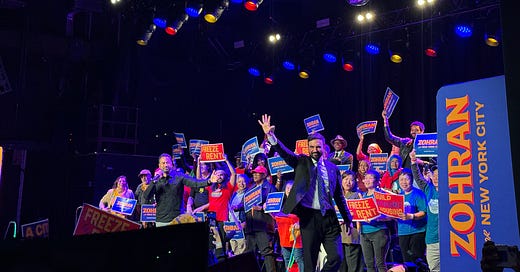Zohran Mamdani's South Asianness doesn't scream from the rooftops
But it was playing on the loudspeakers at his first major campaign rally in Brooklyn
It was a rainy Sunday in Brooklyn, and it wasn’t unusual to see a line that snaked around the block. After all, New Yorkers love standing in lines (NY Times knows). But instead of a heavily teased concert, this was a political rally that had been announced just days ago. A few feet from the sidewalk, someone (an influencer?) was recording themselves yelling something along the lines of ‘socialism will kill us’ and shoving their phone in the faces of anyone entering Brooklyn Steel, the cavernous concert venue where NYC Mayoral candidate Zohran Mamdani’s first major rally took place, on May 4.
Mamdani, who is currently has a not-so-close second spot in running for the Democratic nominee in New York’s Mayoral race, behind former Governor Andrew Cuomo (according to early April polls), has run an energetic campaign focusing on issues like affordability, freezing rents for rent stabilized apartments, free childcare and fast and free buses among others. As a Democratic Socialist candidate, his policy platform appeals to middle income and working-class New Yorkers, a demographic that also overlaps with Gen-Z and Millennial voters, who appear to be equally galvanized by Mamdani’s savvy online presence and his cultural and social connections with progressive, left-leaning spaces.
Inside Brooklyn Steel, the audience ranged from first time 20-something voters, many who revealed to have never attended a political rally before, to South Asian elders in Salwaar Kameezes (Reformation would kill for that style guide) and neatly ironed half sleeved buttoned downs and trousers. Although, they were far from the only set of older New Yorkers at the rally, which also had seniors from white, Jewish, Black and Latin American communities in attendance, the South Asians stood out for their presence in a space (Brooklyn Steel is a popular Brooklyn music venue) that rarely accommodates them.
A group of organizers from Drum Beats NYC, one of the city’s largest collective for low-wage South Asian and Indo-Caribbean immigrants and workers, stood a few steps away from the main hall and close to the bar where people were purchasing drinks and snacks like pretzels and protein bars. As I approached to ask their thoughts on the rally and Mamdani’s campaign, one of the organizers fished out a brown paper bag and began passing around fried pakoras (spiced onion/ potato/spinach fritters), that everyone started munching on immediately. “2 dollars, 2 dollars for one pakora”, another organizer started a mock chant audible only to the group, eliciting several laughs as sweet, cumin fragrance mixed with a heady scent of purpose wafted across the hall.
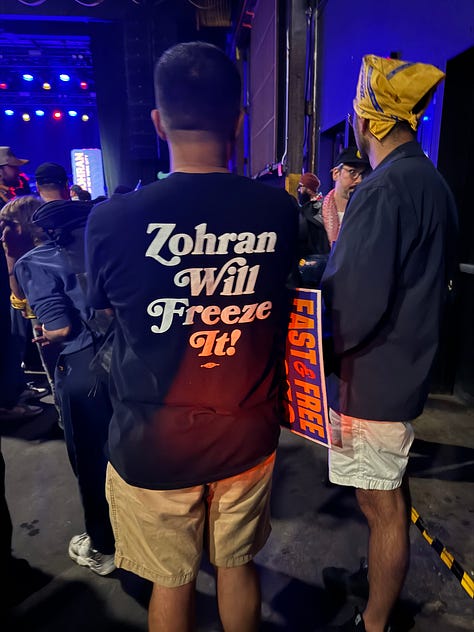
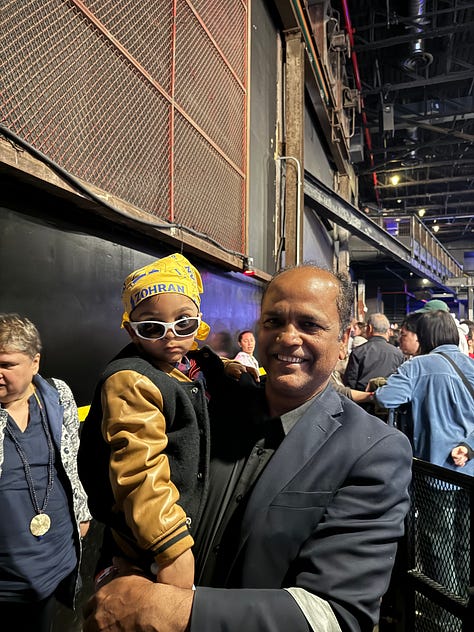
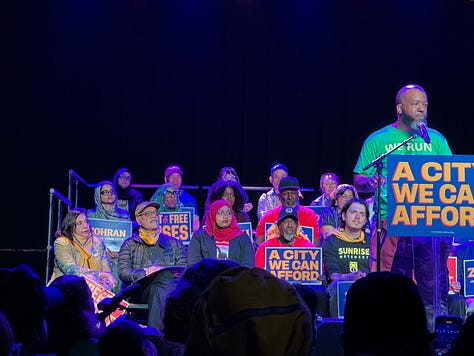
“We’ve seen with the previous Mayors, especially Eric Adams, that he’s willing to gamble with our safety [and] our lives for the sake of his own gain,” said Sherry Padilla, an Indo Caribbean New Yorker and a chapter leader with Drum Beats NYC. “Having a mayor like Zohran who stood up to the Border Czar in Albany (Mamdani had confronted Trump’s Border Czar Tom Homan in March over the arrest of Columbia graduate and green card holder, Mahmoud Khalil by ICE) to protect folks that are impacted, undocumented and at risk, that is something that we want to see more. A mayor that comes to protect us, not just his pocket and his own game,” she continued. Several others in the group expressed similar sentiments around Mamdani’s proposal for free childcare, affordability and his engagement with the taxi driver’s strike in 2021, when he successfully went on a hunger strike for 15 days to advocate for their demands.
Tej Bughram, a 19-year-old who had traveled from Jamaica, Queens talked about Mamadni’s fast and free bus policy explaining that his father is a bus driver for the MTA and spoke of his identity as a ‘lower’ caste Dalit Indo-Caribbean person. “[Caste] is definitely a big issue in the city. Here is a South Asian candidate but how does that relate to caste? Jati and Varna (classifications of the caste system) still play a still play a very big part in the Brown (community) politics in New York. There is a difference between what you get in this country if you’re [from] a different caste”, said Bughram. “This event is about bringing working class communities together. As working-class folks, we are constantly working low/minimum-wage paying jobs in horrible conditions,” said Andrew, another Indo Caribbean Drum Beats organizer, who saw the rally a step towards building power for working-class communities. “With Zohran running for mayor, a person who looks like us is also what encourages people to be out there,” he said.
“[Caste] is definitely a big issue in the city. Here is a South Asian candidate but how does that relate to caste? Jati and Varna (classifications of the caste system) still play a still play a very big part in the Brown (community) politics in New York. There is a difference between what you get in this country if you’re [from] a different caste”
Zohran Mamdani, who if elected will be the first South Asian American Mayor to lead New York, was born in Uganda to Indian filmmaker Mira Nair and Indian-born Ugandan academic Mahmood Mamdani. He dons his South Asian identity with a light touch, like the lived-in white kurta that he is seen wearing in a television campaign ad and on his website. Forgoing the need to emblazon capital R representation, Mamdani’s South Asianness shows up unannounced and matter-of-factly. Like the retro Bollywood and Punjabi songs that were playing on the speakers before the show, without any reference or translation. “I never thought I would be at a rally where I [would] hear Hindi music playing behind us, and I love it”, said filmmaker and writer, Shruti Ganguly, who has called New York home for over two decades and mentioned that she knew Zohran since he was in middle school.
During the rally, the event remained laser focused on his campaign proposals and the various speakers built the case for Mamdani as Mayor, and there were hardly any direct mentions to Mamdani’s South Asian background. Yet his identity permeated everywhere one looked. On the stage, South Asians of all ages sat, some with their foreheads covered in hijabs and Paggs, and holding banners with campaign slogans. Actor and former Obama administration official Kal Penn, who has been outspoken about the overt racism he has experienced over his decades-long acting career, hosted the campaign rally and referenced his seminal role in the Harold and Kumar movies, known for their breakthrough Asian lead representation in Hollywood. Penn also brought up his lesser-known role as a New York city council member Garret Modi in the short-lived NBC sitcom Sunnyside and drew similarities to Mamdani’s campaign for Mayor and his current role as the New York Assemblymember from Astoria. Whereas, even in his slightly off-kilter set, stand-up comic and actor Jaboukie Young-White extolled the virtues of an accented pronunciation of Ramadan (Mamdani is a practicing Muslim who fasted while campaigning during the month-long festival in March).
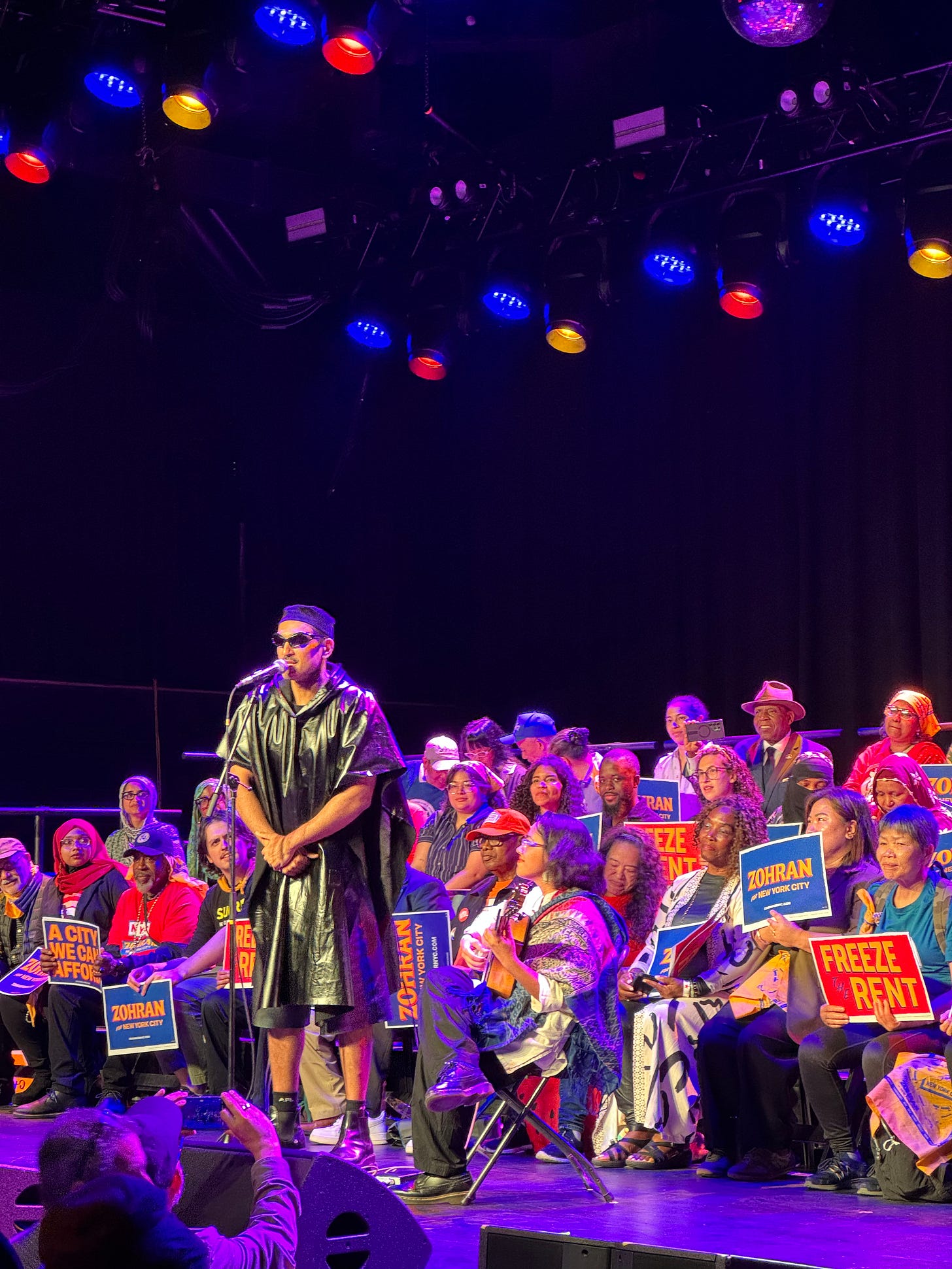
On stage Zohran Mamdani spoke of ‘our minds being chained to anxiety’, the myth that ‘life in New York has to be hard’ and ‘the cricket pitches of Van Cortlandt Park’ – a throwaway reference to British colonial game that is fervently played in South Asian countries yet remains relatively less popular among Americans. But the real desi kicker came after Mamdani’s speech, through a performance by Pakistani American singer and songwriter, Ali Sethi, who confessed that it was his first time performing at Brooklyn Steel. Sethi sang his cross-national hit Pasoori, prompting enthusiastic sing-alongs from the South Asians in the crowd, and head nods and swaying from the rest. “It was quite moving to have the closing tune not be in English, you know, and not really be translated all that much,” said musician Ria Modak who accompanied Sethi on stage for the performance. “I think we’ve gotten to a point where needing to translate our politics or our identities is no longer really necessary, because there’s so many of us, right?” she said.
Note: I’m working on a larger package on the NYC Mayoral elections. Feel free to reach out to me with tips or suggestions. And watch this space, for more Mayoral election coverage from a South Asian/Dalit lens.


